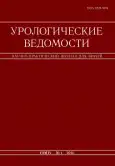Vol 4, No 1 (2014)
- Year: 2014
- Articles: 6
- URL: https://bakhtiniada.ru/uroved/issue/view/168
- DOI: https://doi.org/10.17816/uroved41
Articles
Experience of using fluorescence cystoscopy in the diagnosis of superficial bladder cancer
Abstract
Experience of using fluorescence cystoscopy in the diagnosis of superficial bladder cancer. The study involved 103 patients of both sexes (mean age 58,7 ± 6,3 years) who underwent photodynamic diagnosis (PDD) of bladder cancer. For this purpose 5 mg of photoditazine were injected into the bladder dissolved in 20 ml of saline. The exposure time of the drug in the bladder was from 60 to 90 minutes. Then sequentially performed cystoscopy in white and blue light. For fluorescence diagnosis the light flux with a wavelength of 402 nm was used, which corresponded to the maximum peak of photoditazine absorption. The use of PDD revealed bladder cancer in all 103 patients, while in 69 (67 %) patients were identified in a total of 125 plots mucosa, fluorescent in blue light and unaltered in white light. Histological examination of these sites of mucosa in 52 (41.6 %) cases the tumor (transitional cell carcinoma) was morphologically confirmed, in 14 (11.2 %) cases of dysplasia was detected, in 15 (12 %) - squamous metaplasia of the urothelium, in 31 (24.8 %) - inflammatory changes in the urothelium, in 13 (10.4 %) - leukoplakia of the bladder. Thus, the diagnostic sensitivity of the standard cystoscopy in white light was 62.3 %, and PDD with intravesical use of the drug photodithazine - 96.7 %.
Urology reports (St. - Petersburg). 2014;4(1):3-7
 3-7
3-7


Diagnosis and treatment of infectious and inflammatory complications in the urinary and genital organs of the patients with concomitant injury
Abstract
The article describes the experience of diagnosis and treatment of associated injuries with lesions of the urinary and genital organs. Infectious and inflammatory complications of the urinary and genital organs significantly worsen the clinical course of associated injuries. It is indicated that the improvement of outcomes of prevention and treatment of infectious and inflammatory complications is possible in determining the composition of the microflora and antibiotic susceptibility of urine at an accelerated rate, holding lymphotropic antibiotic therapy and adequate restoration of the flow of urine from the bladde.
Urology reports (St. - Petersburg). 2014;4(1):8-10
 8-10
8-10


Evaluation of the patients quality of life with diabetic and idiopathic bladder hyperactivity
Abstract
The research of the quality of life of 75 patients with diabetic bladder hyperactivity (BH) and 349 patients with idiopathic BH. For the assessment of quality of life the questionnaire KHQ was used. There has been a significant decline in the life quality of the patients of both groups. At the same time the specificies of influence of two forms of BH on some particular aspects of quality of life were marked. When diabetic BH compare to idiopathic BH revealed more severe limitations in daily activities and reducing of emotional status, but less strong influence on personal relationships.
Urology reports (St. - Petersburg). 2014;4(1):11-14
 11-14
11-14


 15-16
15-16


Clinical recommendation for first medical emergency treatment for patients with bladder trauma
Abstract
Clinical recommendations concerning pre-hospital emergency health care delivery as well as emergency health care delivery in the clinical department of emergency for the patients with bladder trauma are described. Clinical recommendations were composed based on the modern recommendations of European Association of Urologist. The statistical significance of recommendations is indicated.
Urology reports (St. - Petersburg). 2014;4(1):17-19
 17-19
17-19


Clinical recommendation for first medical emergency treatment for patients with kidney and ureter trauma
Abstract
Clinical recommendations concerning pre-hospital emergency health care delivery as well as emergency health care delivery in the clinical department of emergency for the patients with kidney and ureter trauma are described. Clinical recommendations were composed based on the modern recommendations of European Association of Urologist. The statistical significance of recommendations is indicated.
Urology reports (St. - Petersburg). 2014;4(1):20-23
 20-23
20-23








